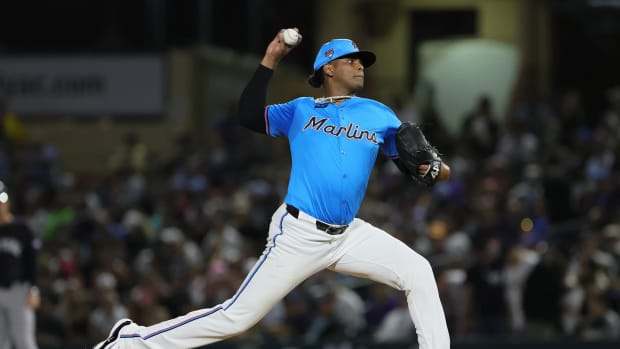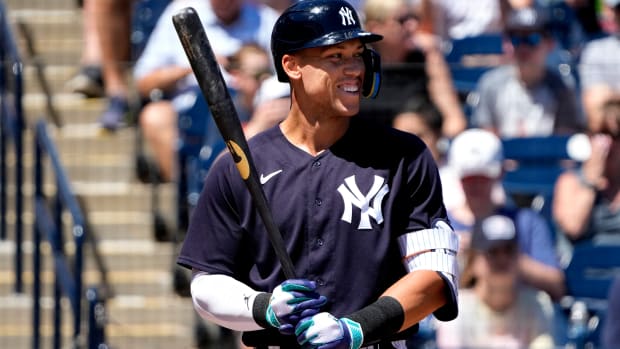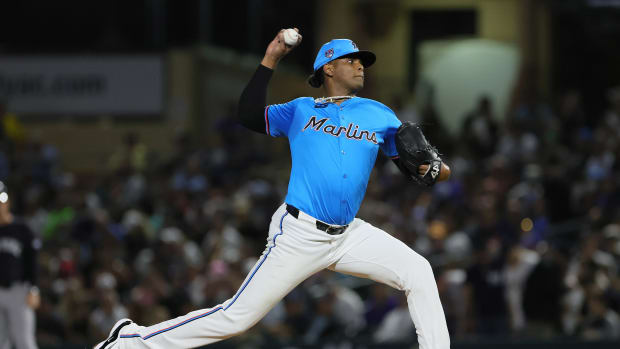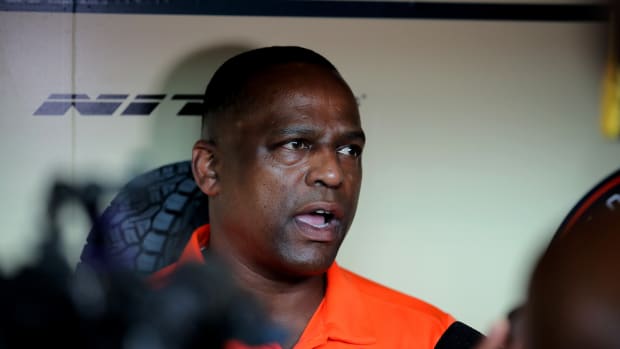Remembering Moose Stubing, Beloved Baseball Coach and Basketball Ref
The 1989 Elias Baseball Analyst nicknamed him “Double Zero,” but fans of baseball and basketball knew the big, amiable lug by a more affectionate sobriquet: “Moose,” with no shortage of o’s when he was introduced to the crowd. His time at the major league level was fleeting; as Elias discovered, he's the only man ever to go hitless as a player and winless as a manager. But the Bronx-born cowboy earned a spot in the hearts of fans, particularly in cities common to the Texas and Pacific Coast Leagues, where he played and managed, and the Western Athletic, Southwest and Pac-12 Conferences, where he refereed basketball. "Share a cold one with Moose Stubing," read a banner across the April 1999 issue of Referee, which featured him sharing suds as well as his wisdom and self-deprecating wit. Alas that's one bucket-list item that this Salt Lake City-raised scribe won't get to check off. Stubing passed away on Friday at the age of 79.
As a slugging left-handed first baseman, Stubing hit 192 home runs while spending parts of 15 seasons toiling in the minors, from 1956 to ’69, with a brief cameo in ’77. He only got one call to the majors, late in 1967 with the Angels, and went 0-for-5 with four strikeouts, all as a pinch hitter. By that point, at 29 years old, he had begun coaching younger players as well. He found success in that realm, and later served as the third base and hitting coach for the Angels. At the tail end of the 1988 season, after manager Cookie Rojas was fired, he went 0-8 as an interim manager.
Stubing never let that futility define him. He "had no complaints about his oh-fers," wrote Keith Olbermann. Indeed, in a rich career in baseball that spanned more than a half-century, Stubing mentored many future major league players and managers. In the offseason, he served as a respected referee who was frequently acknowledged with cheers in places like Albuquerque (home of the University of New Mexico as well the minor league Dukes), Salt Lake City (home of the University of Utah and the PCL's Gulls) and El Paso (home of the University of Texas-El Paso and the minor league Sun Kings and Diablos). He settled in El Paso and in 1990 was elected to the city's Baseball Hall of Fame.
Growing up in the Bronx, 6’ 3” Lawrence George Stubing—who rooted for the Giants, not the Yankees— earned All-City honors in basketball and football while at Evander Childs High School. Instead of accepting a football scholarship to Penn State, Stubing signed a professional contract with the Pirates, receiving a bonus of a mere $400, with a $175 monthly salary. The burly slugger earned his nickname from an imposing slide into home plate. "Look at that big moose mow down that poor catcher!" exclaimed the announcer.
"I might have survived if I had stayed in the Bronx," Stubing told the Los Angeles Times' Ross Newhan in 1985. "But I'd probably have been digging ditches, running elevators or driving a truck. I'd have never gotten out and learned what a great world it is."
After just one 13-game stint with the Pirates' Class D affiliate, Stubing was released and picked up by the Giants. He showed good power in the low minors, hitting .319/.425/.496 at Class C St. Cloud in 1958 and .292/.381/.475 at Double A Rio Grande in 1960, but he scuffled upon reaching Triple A in 1961—not that the Giants, who were struggling to fit the 1958 and '59 NL Rookies of the Year, Orlando Cepeda and Willie McCovery, into the same lineup—were holding a job open for him. "Basically," Stubing later recalled, "all I could do was hit a little. I couldn't really run or field."
He found more success with the Sun Kings of the Double A Texas League, hitting a combined 62 homers and driving in 206 runs in 1963–64. He even took the mound for six games in the former year, and mashed an impressive .316/.449/.613 with a league-high 120 RBis in the latter; he also went 12-for-12 in stolen bases despite being "known to fly down to first base in something like 10 seconds flat," as the El Paso Herald-Post's Bob Ingram wrote. The 1963 squad set a league record with 207 homers, including 36 by 19-year-old outfielder Jose Cardenal and 35 by 21-year-old Dick Deitz, both of whom went onto successful major league careers.
In April 1965, Stubing was traded to the Cardinals for infielder George Williams. He spent two seasons in their organization, scuffling again in Triple A Jacksonville before returning to the Texas League. With a child on the way, he began supplementing his minor league income by refereeing high school basketball games in El Paso, sometimes doing three or four per day.
Though he retired as a player in 1966 and bought a beer distributorship in El Paso, the 29-year-old Stubing was lured back into baseball by the Angels in 1967. Under legendary minor league manager Rocky Bridges, he served as the Sun Kings' player-coach. After winning the Topps Player of the Month award for July—a surge that put him into the league lead in batting average at .331—he finally got the call to the majors, debuting on August 14. Pinch hitting for second baseman Bobby Knoop against the Twins' Al Worthington, he struck out, and he did the same the next night against Jim Perry. Over a 15-day span, manager Bill Rigney sent him to take his hacks five times, and each time he returned to his spot on the bench, putting a ball in play just once. In his final at-bat, he whiffed against future two-time Cy Young winner Denny McLain.
Stubing returned to El Paso in 1968, this time under Chuck Tanner, who on the final day of the season let him play every position in a single game. Facing the Dodgers' Double A Albuquerque affiliate, he homered, threw a 1-2-3 inning, and made his only putout of the night via a strikeout. "I guess I intimidated them and they didn't want to hit the ball to me," he told Ingram.
Stubing spent one more season as a player-coach in El Paso; taking advantage of an experimental "wild card" pinch hitter rule—allowed to bat more than once a game, provided the player for whom he is substituted leaves the game—to hit three pinch homers, including two in the same game. More importantly, he became friends with Don Haskins, the legendary coach of the UTEP basketball team. Haskins' letter of recommendation led to the Western Athletic Conference hiring Stubing to work 60 games a year in addition to his minor league coaching duties. He later worked several NCAA and NIT tournaments.
After years of scouting and coaching, Stubing became the manager of the Angels' A-level Quad Cities affiliate in 1976. He led a squad featuring future All-Stars Carney Lansford and Dickie Thon, and future manager Joe Maddon to the Midwest League second-half division championship. Thon and Maddon accompanied him to Salinas of the California League the next year, where Stubing's squad won the first-half championship and went 79–61 overall. Promoted again, he piloted the El Paso Diablos to an 80–55 record and the Texas League championship in 1978. After a less successful season in '79, it was on to Salt Lake City, where he ruptured his left Achilles tendon while being introduced on Opening Night in 1980. In two seasons in Salt Lake, he oversaw Thon, Tom Brunansky, Brian Harper and dozens of other future major leaguers, and made an impression on a rabid pre-teen baseball and basketball nut through his quips in the Salt Lake Tribune.
Stubing moved along to Spokane (1982) and Edmonton (1983–84), after the Angels switched affiliates. Though his team went a combined 69–73 in 1984, the Trappers' 35–35 first-half record was enough to win the North Division title. The team went on to win a best-of-five division series over Salt Lake and a best-of-three championship series over Hawaii.
The Free Agent Market Is Slow Partially Because It's Extremely Flawed
After spending part of that September with the Angels, Stubing was named the team's third base and hitting coach under manager Gene Mauch. "We're actually making this move at the behest of the nation's college basketball coaches," joked Angels GM Mike Port.
Stubing helped youngsters such as shortstop Dick Schoefield and centerfielder Gary Pettis, both of whom he'd overseen in at Triple A, hone their swings. The pair improved in 1986, and the team won 92 games and the AL West title. But with the spotlight comes the scrutiny. In the sixth inning of Game 2 of the ALCS against the Red Sox, Stubing failed to put up a stop sign for Bobby Grich, who was thrown out trying to score the tying run from second base. He was trying to deke Boston leftfielder Jim Rice by verbally telling Grich to stop, but the command was lost amid the Fenway Park din. "I blew it," said Stubing afterwards. "I waited too long." The Angels eventually lost an agonizing seven-game series.
The team slipped below .500 under Mauch in 1987 and under Rojas in '88. They were a respectable 75–75 until a four-game losing streak during which Rojas after he accidentally cost himself a pitcher by visiting the mound twice in one inning. He was fired, and the streak ran to 12 games under Stubing. "Eight days on the job beats spending eight days in prison," he quipped. Thankfully, he fell short of the major league record of a 0-13 start to his career.
After the season, the Angels hired Doug Rader to take over managerial duties, depriving Stubing of a chance to challenge the major league record of 13 straight managerial losses to start his career. Stubing returned to coaching, but he did get an appearance on a Topps card out of the deal. He remained on staff until being fired after the 1990 season, and continued to double as a scout and referee thereafter. He took great pride in using his sense of humor to defuse the tension in the latter role. "You've got to know when to smile and when to frown," he told writer Lee Godden for Referee in 1999. "If you don't smile at the right times, players will think you've got it in for them, that you don't like them. And that can cause unnecessary problems."
Stubing recounted to Godden a story about flight delays causing him to be 15 minutes late to work a University of Utah game. After receiving a standing ovation upon arrival, "When I called the first foul on Utah, I heard some guy in the stand yell out, ‘Now I wish that dam plane would have crashed!’”
Stubing hung up his whistle in 2001 and continued to scout for the Angels through ’06, when he moved on to spend three seasons as a special assistant for the Nationals, the first two under GM Jim Bowden, whose 2009 resignation led to the end of Stubing's tenure later that year. His wife of 59 years, Estelle, passed away in 2017.
It may not have been at the major league level, but Stubing did collect more than his share of hits, wins and friends around the country. Raise a glass for one last Moose call.


































